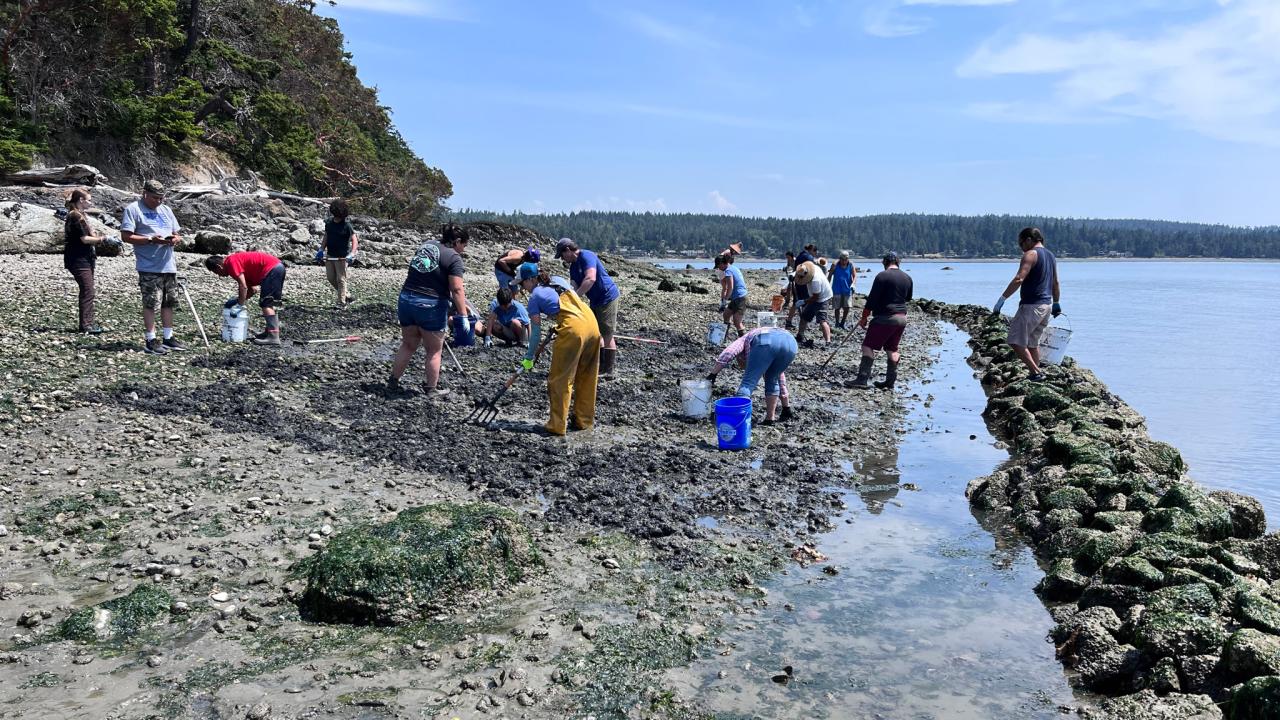Announcement
For the Swinomish Indian Tribal Community (SITC), reviving the ancient tradition of clam gardening is not just about sustaining a traditional food or building resilience to climate change, it’s about community — strengthening connections across the Swinomish community and sharing knowledge with other Indigenous communities.
The Swinomish Indian Tribal Community has been building the first modern clam garden in the United States since summer 2022, a traditional practice that has been largely dormant for hundreds of years. The goals of this community-based, biocultural project are twofold, to increase native clam abundance and enhance the health and well-being of community members.

Clam gardens are intertidal features constructed and maintained by Northwest Coastal Indigenous people to increase clam production. They require tending and care from community members to move and clear rocks and seaweed, make rock walls to stabilize sediment, harvest larger clams, and turn the beach over to improve beach health. Behind a clam garden’s rock wall, which runs parallel to the shore, the beach fills in with a gentle slope of sand and shells. The resulting terrace provides ideal clam habitat and a protected zone with the right conditions for intertidal species to thrive, even as ocean conditions change. For this reason, clam gardens not only support clams, they also increase biodiversity by supporting other species like crabs, sea cucumbers, sea urchins and kelp.
As clams and their habitats are threatened by ocean acidification and sea level rise, clam gardens offer a pathway to healing the ecology of the system while also sustaining traditional foods and enabling food security and food sovereignty. Clam gardens provide opportunities for SITC to come together to connect with ancestral teachings and reinforce community values like stewardship and reciprocity. Swinomish Shellfish Community Liaison, Squi-Qui (Joe Williams), describes “looking to our ancestor’s playbook on how to adapt to climate change”, referring to ancient teachings and Indigenous science for guidance on addressing current challenges. Courtney Grenier, a Marine Ecologist with SITC, explains “From my perspective, I love this project for so many reasons. One of them is that it is a positive example of how Indigenous knowledge is shared across time (many generations of knowledge shared) and space (geographically from community to community). Swinomish visited, and continues to engage with, their relatives in British Columbia to learn about clam garden practices and is also sharing the knowledge with other Indigenous communities who are interested in building a clam garden.”

The Swinomish Indian Tribal Community has been connecting with Coast Salish First Nations in British Columbia undertaking similar efforts to revive ancient clam gardens, some of which date back 4,000 years. Sharing knowledge with Indigenous communities north of the border has been key to implementing this project. Meeting extended family of the Coast Salish Nation doing similar work is helping rebuild ties severed by the US-Canada border and is instilling hope in the face of environmental, socio-cultural, and Tribal sovereignty challenges. Grenier notes, “The partnerships and relationships that we’ve formed across Native communities in the Pacific is a big factor of working through these huge challenges that seem out of our control. It makes it seem achievable with these partnerships.”
While healing the ecology of the system and seeing increased clam production and biodiversity is a longer-term goal, this project’s success is measured by much more than ecological metrics. Getting community members onto the beach to connect and share stories has already been a big success.
The Bureau of Indian Affairs Branch of Tribal Climate Resilience has supported several climate projects with the Swinomish Tribe through financial and technical assistance. Learn more about funding opportunities through the Branch of Tribal Climate Resilience Annual Award Program here.
This project was supported in part by the Northwest Climate Adaptation Science Center. Funding is available periodically through the Northwest Climate Adaptation Science Center to support climate adaptation projects across the region. Tribal organizations may participate in CASC-funded projects and receive funds via subawards, contracts or interagency agreements through an eligible organization. Learn more.
Image

Related Page or Document
Contact Us
Albuquerque, NM 87104
8:30 a.m.–4:30 p.m. MST, Monday–Friday.


